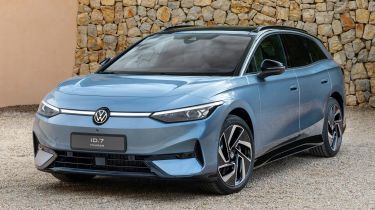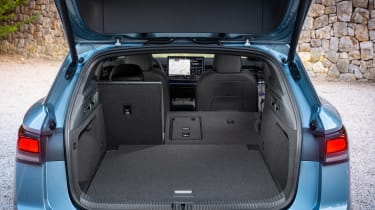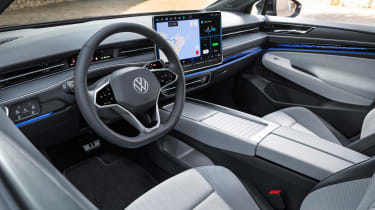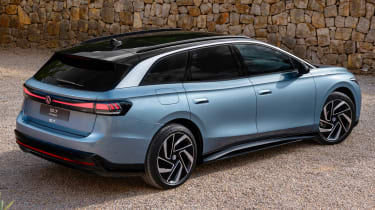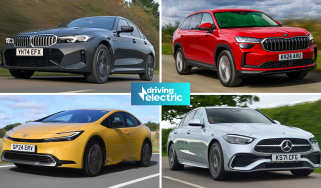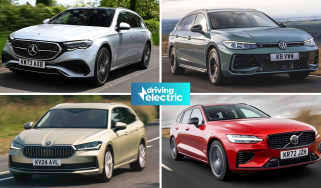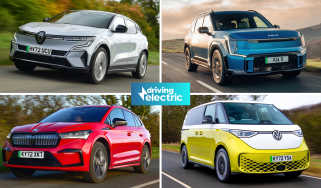New Volkswagen ID.7 Tourer: specs and full details for the practical electric estate
VW’s electric exec gets a practical estate model with a 605-litre boot and 426-mile range
Almost a year after the Volkswagen ID.7 fastback electric saloon was revealed, VW has unveiled a new, more practical estate version, badged as the Volkswagen ID.7 Tourer.
Looking much the same as the standard car from the front, the Tourer benefits from a much higher roofline at the rear, meaning it boasts 565 litres of space behind the rear seats. While this is only 32 litres more than the standard car, the boxier shape of the Tourer’s boot should make it easier to load larger items. Furthermore, owners can straighten the rear seats to a more upright position to expand space to 605 litres – more than even the new BMW i5 Touring – and maintain the ability to carry rear passengers.
Unfortunately, unlike the UK’s best-selling EV, the Tesla Model Y, the ID.7 doesn’t have a ‘frunk’ under the bonnet for storing cables. However, those planning to use the Volkswagen ID.7 Tourer as a zero-emissions load lugger can fold down the rear seats to reveal 1,714 litres of storage. Volkswagen also says the ID.7 Tourer is rated to tow braked trailers weighing up to 1,200kg.
As mentioned, the Tourer is fundamentally similar to the standard Volkswagen ID.7 in terms of general design. There are some differences, though; the Tourer gets a contrasting roof with matching roof rails, as well as a premium-looking aluminium trip that stretches from the C-pillar, all the way to the front of the car, emphasising the Touring’s almost five-metre length.
On the inside, however, things are almost identical to the fastback model; the ID.7 debuts a new approach to interior design for VW, featuring more premium materials than the somewhat plasticky VW electric car cabins we’ve seen of late.
The focus of the interior is a 13-inch touchscreen, which sits above a set of – thankfully, illuminated – touch-sensitive climate control sliders and is complemented by a slim digital instrument cluster that’s nestled within the dashboard. It runs VW’s latest infotainment system which, from our experience in the standard ID.7, is a marked step up from the glitchy and laggy software Volkswagen has been installing in its cars of late.
Unlike the regular Volkswagen ID.7 which is currently only available in a singular ‘Pro Match S’ specification, the Tourer will instead be offered in various guises at launch. Buyers will be able to choose from two battery sizes – 77kWh and 86kWh – with both being powered by a single, rear-mounted 282bhp electric motor.
According to VW, the smaller of the pair of batteries is sufficient for a range of up to 372 miles – only 12 miles less than the saloon. The 86kWh unit is not yet offered in the standard ID.7 and it provides a claimed range of up to 426 miles. The two battery sizes can rapid charge at a DC speed of 170kW and 200kW respectively, although given the difference in outright capacity, both take 28 minutes to complete a 10-80% top-up at their maximum charging rates.
The German giant remains secretive regarding the ID.7 Tourer’s performance figures, though we don’t suspect the estate will be far off the standard ID.7’s 6.5-second 0-62mph time. Of course, the 86kWh car will almost inevitably be slightly slower than that, due to the weight of the bigger battery. Those looking for more performance should hold out for the forthcoming GTX model which is set to feature a dual electric motor setup and somewhere in the region of 400bhp.
The Volkswagen ID.7 Tourer is due to go on sale in the summer and UK pricing is yet to be confirmed. Given that the standard car retails for £51,550, we expect a small uplift for the estate, probably in the region of around £2,000 to £3,000. This would still make the ID.7 around £10,000 cheaper than even the entry-level BMW i5 Touring, though expect big battery versions to top £60,000.
Recommended
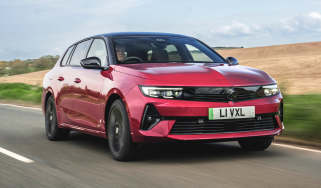
EV Deal of the Day: bargain Vauxhall Astra Sports Tourer Electric for only £170 per month
Most Popular
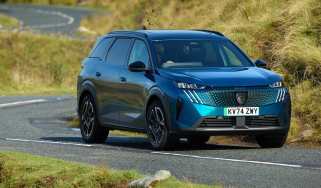
EV Deal of the Day: family-friendly Peugeot E-5008 for £261 per month

